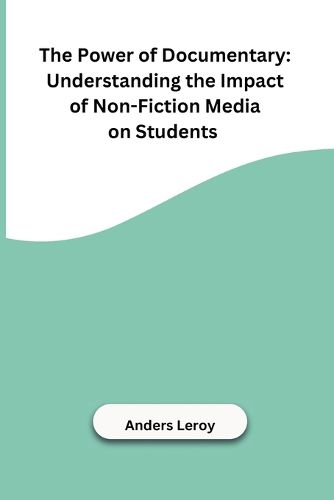Readings Newsletter
Become a Readings Member to make your shopping experience even easier.
Sign in or sign up for free!
You’re not far away from qualifying for FREE standard shipping within Australia
You’ve qualified for FREE standard shipping within Australia
The cart is loading…






This title is printed to order. This book may have been self-published. If so, we cannot guarantee the quality of the content. In the main most books will have gone through the editing process however some may not. We therefore suggest that you be aware of this before ordering this book. If in doubt check either the author or publisher’s details as we are unable to accept any returns unless they are faulty. Please contact us if you have any questions.
The Importance of Non-Fiction Media in EducationIn this digital age, where information is just a click away, non-fiction media has emerged as a powerful tool in education. From documentaries to news articles, this non-fiction content provides students with a deeper understanding of the world around them. As students pursuing film and media studies, it is essential to recognize the significance of non-fiction media in shaping our education and broadening our perspectives.Firstly, non-fiction media offers a tangible connection between theory and practice. While textbooks and lectures provide valuable knowledge, non-fiction media brings subjects to life by showcasing real-life examples and events. By watching documentaries or analyzing news reports, students can witness firsthand how concepts and theories apply to real-world scenarios. This engagement fosters critical thinking skills, enabling students to analyze, evaluate, and form their own opinions on the subjects being presented.Moreover, non-fiction media has the power to inspire and evoke empathy. Documentaries, in particular, offer us a window into diverse cultures, historical events, and social issues. By immersing ourselves in these stories, we gain a deeper understanding of the human experience and develop empathy towards different perspectives. This empathy is crucial for film and media students, as it allows us to create impactful content that resonates with audiences on a global scale.Furthermore, non-fiction media promotes media literacy and information literacy. In an era of fake news and misinformation, it is vital for students to develop critical media consumption skills. Non-fiction media serves as a platform to explore different sources, evaluate credibility, and fact-check information. By engaging with non-fiction media, students learn to discern between reliable and unreliable sources, thus becoming more informed and responsible media consumers.Lastly, non-fiction media sparks curiosity and encourages lifelong learning. Through documentaries and news articles, students discover new topics, cultures, and ideas that they may not have encountered otherwise. This exposure to diverse content broadens their horizons and motivates them to delve deeper into subjects that pique their interest. Non-fiction media acts as a catalyst for intellectual growth, inspiring students to continue their education beyond the classroom.
$9.00 standard shipping within Australia
FREE standard shipping within Australia for orders over $100.00
Express & International shipping calculated at checkout
This title is printed to order. This book may have been self-published. If so, we cannot guarantee the quality of the content. In the main most books will have gone through the editing process however some may not. We therefore suggest that you be aware of this before ordering this book. If in doubt check either the author or publisher’s details as we are unable to accept any returns unless they are faulty. Please contact us if you have any questions.
The Importance of Non-Fiction Media in EducationIn this digital age, where information is just a click away, non-fiction media has emerged as a powerful tool in education. From documentaries to news articles, this non-fiction content provides students with a deeper understanding of the world around them. As students pursuing film and media studies, it is essential to recognize the significance of non-fiction media in shaping our education and broadening our perspectives.Firstly, non-fiction media offers a tangible connection between theory and practice. While textbooks and lectures provide valuable knowledge, non-fiction media brings subjects to life by showcasing real-life examples and events. By watching documentaries or analyzing news reports, students can witness firsthand how concepts and theories apply to real-world scenarios. This engagement fosters critical thinking skills, enabling students to analyze, evaluate, and form their own opinions on the subjects being presented.Moreover, non-fiction media has the power to inspire and evoke empathy. Documentaries, in particular, offer us a window into diverse cultures, historical events, and social issues. By immersing ourselves in these stories, we gain a deeper understanding of the human experience and develop empathy towards different perspectives. This empathy is crucial for film and media students, as it allows us to create impactful content that resonates with audiences on a global scale.Furthermore, non-fiction media promotes media literacy and information literacy. In an era of fake news and misinformation, it is vital for students to develop critical media consumption skills. Non-fiction media serves as a platform to explore different sources, evaluate credibility, and fact-check information. By engaging with non-fiction media, students learn to discern between reliable and unreliable sources, thus becoming more informed and responsible media consumers.Lastly, non-fiction media sparks curiosity and encourages lifelong learning. Through documentaries and news articles, students discover new topics, cultures, and ideas that they may not have encountered otherwise. This exposure to diverse content broadens their horizons and motivates them to delve deeper into subjects that pique their interest. Non-fiction media acts as a catalyst for intellectual growth, inspiring students to continue their education beyond the classroom.